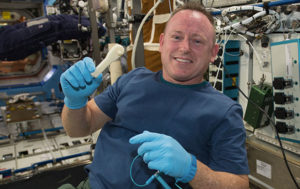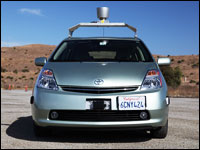
Consumer Reports has unleashed its findings on toxic levels of Bisphenol A (BPA) in food packaging on a largely unsuspecting public. Before the report, many felt the BPA danger had passed with the introduction of BPA-free baby bottles and so-called microwave-safe plastics. Not so, says the report: Certain canned foods contain high levels of BPA — but it may also be present in alternative packaging.
“BPA is the building block of the polycarbonate plastic and epoxy resins used in many food and beverage containers,” Janet Nudelman, policy director at the Breast Cancer Fund, told TechNewsWorld.
“It was developed in the 1930s as a synthetic estrogen, so it’s not surprising that it acts like an estrogen in humans, increasing the risk of breast cancer and other hormonally sensitive diseases,” she explained.
“Recent science has shown that with hormone-disrupting chemicals like BPA, even low doses can have devastating effects,” said Nudelman.
Choose Your Poison
Consumer Reports tested canned foods, including soups, juice, tuna and green beans, and found that almost all of the 19 name-brand foods tested contained measurable levels of BPA. Most disturbing: BPA was found in a diverse assortment of canned foods, including some labeled “organic” and some packaged in “BPA-free” cans.
Consumer Reports’ tests of a few comparable products in alternative types of packaging showed lower levels of BPA in most, but not all, cases. The results are reported in the December 2009 issue of the magazine and are available online for free.
Not all experts agree with Consumer Reports’ findings, however.
“The recent Consumer Reports article reports the presence of BPA in many of the 19 name-brand foods analyzed,” said Carl K. Winter, Ph.D., director of the FoodSafe program and extension food toxicologist with the Department of Food Science and Technology at UC Davis.
“The mere presence of BPA in the foods is not sufficient to establish human risk levels,” Winter told TechNewsWorld.
“The first principle of toxicology is ‘the dose makes the poison.’ It’s the AMOUNT of a potentially hazardous chemical, not its presence or absence, that determines the potential for harm,” he maintained.
“What is missing in the article is an appropriate risk assessment that accurately calculates potential human exposure to BPA and relates it to the most widely accepted health criteria for the chemical,” said Winter, who receives no funding from the chemical or food industries for his research or outreach programs.
“Conclusions regarding the safety of BPA in foods, in the absence of a true risk assessment, should be considered as ‘opinions’ rather than scientifically defensible facts,” he concluded.
Why BPA Hasn’t Been Eliminated
“One of the primary uses of BPA is to make epoxy resins, which are formed by a chemical reaction of BPA with other substances,” noted Steve Hentges, Ph.D., executive director of the American Chemistry Council’s Polycarbonate/BPA Global Group. “Only trace levels of residual BPA remain in a finished epoxy resin, and without BPA, epoxy resins would not exist.”
If a BPA lining were not used, Hentges told TechNewsWorld, canned foods would most certainly become poisonous.
“Most food and beverage cans include epoxy resins that provide real and important health benefits by preventing corrosion of the metal can and contamination of food,” he explained.
“Further, epoxy resin coatings function well at high temperatures, which facilitate sterilization of food products when initially packaged,” added Hentges. “The high performance of epoxy resin coatings also helps to achieve long shelf life in canned products.”
The ACC’s mission, of course, is “to deliver business value to its members through exceptional advocacy based on enhanced member performance, high quality scientific research, communications, effective participation in the political process, and a commitment to sustainable development through member contributions to economic, environmental and societal progress.”
The organization represents the leading companies engaged in the business of chemistry, which is a US$664 billion enterprise and a key element of the U.S. economy.
Fire and Cross-Fire
Compelling science condemning the use of BPA has led to a flurry of legislative activity.
“Minnesota, Connecticut, Chicago and three New York counties have passed legislation banning BPA from baby bottles and sippy cups, and 26 other states and municipalities and the U.S. Congress are considering similar legislation,” noted the Breast Cancer Fund’s Nudelman.
The Breast Cancer Fund is heavily supporting federal legislation before Congress that would ban BPA from food and beverage containers.
“We’re working hard on the bill,” Nudelman said. “Also, the FDA is re-reviewing its mightily flawed BPA assessment from last year, and is expected to make an announcement by Nov. 30. We are concerned that the FDA is again not looking at all of the science, and that they’ve left Mitchell Cheeseman as the point person for the safety review despite his documented conflicts of interest.”
In the marketplace, chemical manufacturer Sunoco announced it will sell BPA only to companies that guarantee the chemical will not be used to make children’s food and water containers, Nudelman said.
Leading infant formula companies are beginning to use BPA-free packaging, six baby bottle manufacturers have pledged to stop using the chemical, and retailers including CVS, Kmart, Safeway, Toys ‘R’ Us and Wal-Mart have announced they will stop selling BPA-containing baby bottles.
“Still, many BPA-containing products, including canned foods, remain on store shelves,” observed Nudelman.
The ACC has insisted that BPA fear is baseless — and pointless, since there are no real alternatives to BPA to protect consumers from rusty cans and undercooked canned foods.
“Epoxy resin coatings have been safely used for decades, and alternatives that function as well as epoxy resins are not generally available,” said the ACC’s Hentges.
“There is a consensus among government bodies around the world, 11 of which have extensively and recently reviewed the science on both sides and rejected claims that BPA poses health risks,” he explained. “These regulatory bodies deem BPA safe for use in food packaging.”
Consumers, however, are not at all sure they agree with those authorities.
Worry vs. Worry-Free
“Many Americans have come to agree that BPA is probably worrisome enough to avoid,” said Alicia Voorhies, a registered nurse and owner of the The Soft Landing, which sells BPA-free eating gear and toys for children.
“The move to a BPA-free lifestyle no longer requires a leap of faith when current research continually points to new evidence of harm to our health and the health of our children,” Voorhies told TechNewsWorld.
“Recent studies have linked BPA to effects such as increased aggression in toddler girls, heart disease, obesity, early puberty and infertility,” she continued.
“We used to think that bypassing polycarbonate bottles — which uses BPA to harden the plastic — would get the job done. But now we’re learning that BPA is lurking in the most unexpected places: canned foods and aluminum bottles, some color-tinted polypropylene dishes and teethers, pizza boxes made of recycled cardboard, and carbonless credit card receipts,” Voorhies said.
Still, is it possible that concerns are driven by hype?
“When a single chemical is produced in such massive quantities as 6 billion pounds per year, we are remiss if we don’t worry about widespread human exposure,” argued Voorhies.
“We’re talking about chronic exposure to an endocrine-disrupting chemical on a large scale from multiple sources: air, food, household dust, physical contact and water,” she explained.
“While it’s true that we shouldn’t live in fear, we must be willing to educate ourselves and make changes when possible,” Voorhies said. “BPA is a chemical we can absolutely live without, and many responsive manufacturers have already proven it can be easily substituted in most cases.”





















































